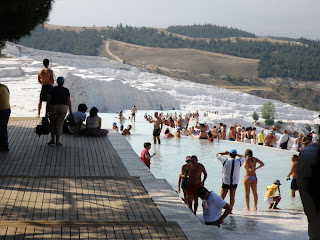 |
| Goofing off at museum |
 |
| These folks were short!! |
On Thursday we woke up really early in the morning and took a van to Marmaris then took a bigger nicer bus to a ancient city called Ephesus. Papa and I went to the museum while Tutu and BeBe went to the house of the Virgin Mary.
Then we ate an ok lunch with the tour group and went to the ruins of Ephesus. We looked at some old rocks that all looked the same and saw some big gates that looked magnificent and also saw the largest theater out of all other ancient theaters. The acoustics were amazing.
 |
| Baths at Ephesus. Required for entry to city. |
While we were looking at some big rocks and columns that all looked the same we looked at the infirmary (ancient hospital) and also learned about some of the gods that supposedly roamed around Ephesus. If someone got healed in the infirmary then they left a part of themselves as an offering of gratitude to whatever god was responsible for healing them. Most people who survived the hospital cut off an ear to leave at the infirmary.
 |
| Ephesus -- it was hot! |
 |
| The umbrella helped |
 |
| Crosses & Bones game circle on right. The 6 letters to test if Christian on left. |
 |
| Taking a break |
A popular game was called crosses and bones. People played this game on stones all over the city. There were also 6 letters that would be written next to the circle that they played in. When a stranger arrived he could play the game and people would ask him what each of those letters meant. If he answered all 6 letters correctly, then he was accepted as a Christian. They did this because Christians had to keep their new faith a secret.
 |
| Backgammon stone |
 |
| Another stone game board |
They also played backgammon on a big stone area. And some other game we didn't know about.
 |
| Gate of Hercules on main pedestrian street |
The main road was for pedestrians only. It was steep and sloped down over 60 feet from the baths down to the library. About halfway down was the Gate of Hercules. This was 2 columns placed on either side of the road that made the road get narrow. This prevented chariots from using the road.
 |
| Library of Celsus. One of only 2 libraries in the ancient world |
Then after we looked at the Brothel which is also the first place in the world to actually advertise anything and they were advertising women. Stones were put in the roadway down near the port. Arriving sailors could look at the stones and decide which woman they wanted to meet. The stone would have several carvings like a woman's face and name, a heart that was shattered, a circle that meant money and a footprint shape. This signified that if a person had a broken heart and some money, he could follow the footprints and have the woman's company. A sailor would decide which face he liked best and follow that shape footprint to that woman's house or brothel. World's first known advertising.
 |
| Main street going down to Library. The valley in the background used to be the harbor. Dirt has filled in about 8 miles in the past 2,000 years. |
 |
| Our guide in latrines |
Then when we learned about all of the gates and about the statues and how long it took to make them. Then after all of that when we went through the magnificent halls to enter the theatre we checked out the accoustics for the largest known theater of Rome Greece and Turkey. After we did that we drove in the bus for another 3 hours and they showed us the hotel we would be sleeping in. We had a ok dinner and tried to go to sleep.
 |
| Swimming in Cleopatra's Pool |
 |
| A hot spring source that fills Cleopatra's Pool |
 |
| Top of mountain at Pamukkale |
Which after swimming in the pool we left and went to a place that is a mountain that is white which I thought was interesting.
The Turks call this the Cotton Castle. There is a lot of mineral deposit from the flowing waters. I think it is called calcium carbonate. It is white and looks like snow but it is hard. There are shallow pools formed from this calcium carbonate that terrace down the mountain.
 |
| The fill trench with constantly flowing water to the pools |
 |
| On top of Pamukkale |
Then I went climbing down the mountain barefoot because they made you take your shoes off and went into the warm pools in the mountain. The guide said the waters will be all gone in 150 years and Pamukkale will no longer exist.
 |
| Descending the pools at Pamukkale |
After that we went back to the bus and went to a onyx making place and looked at how they made the onyx. After that we started the long ride back to Marmaris.
 |
| Lots of calcium carbonate deposits over a very long time |
 |
| What a shame this will all be gone in 150 years |
.
Cool blog post Zach.
ReplyDeleteDid you know Calcium Carbonate is used as medicene? It is the active ingrediant in products like TUMS. It is used as an ant-acid for people to take when they have heartburn or eat too much spicey food.
It is also used to treat diarehia.
Thought you might find it interesting to know that its used for medicine.
It's also the white powder that form on our fish tank when water evaporates.